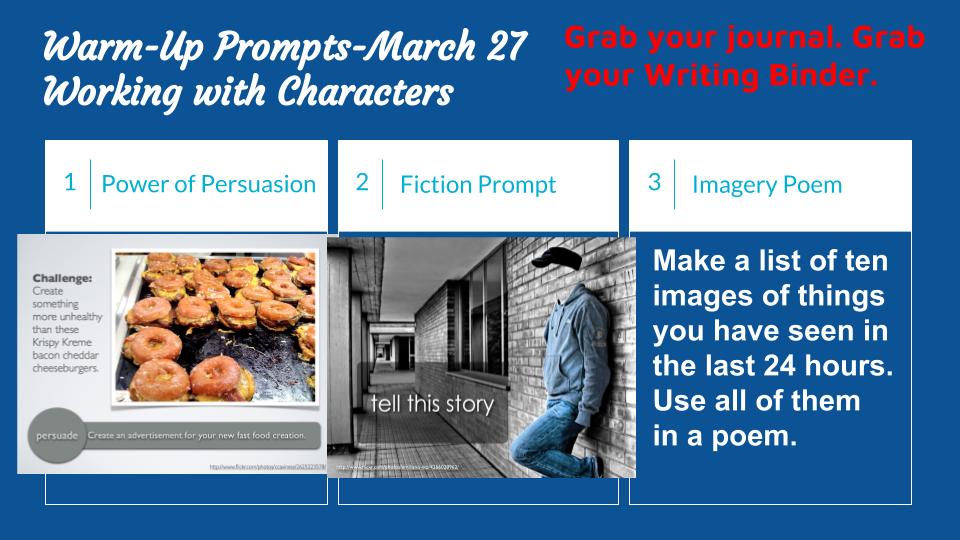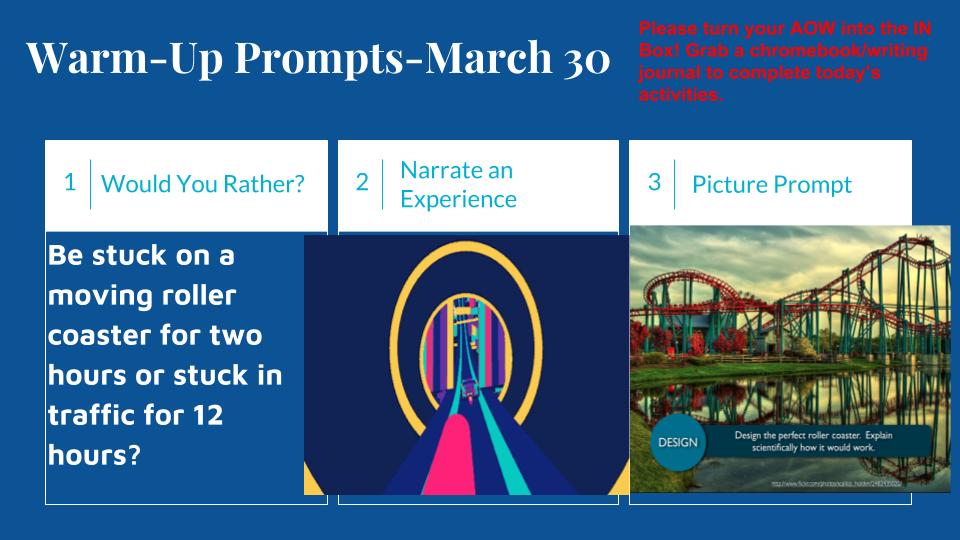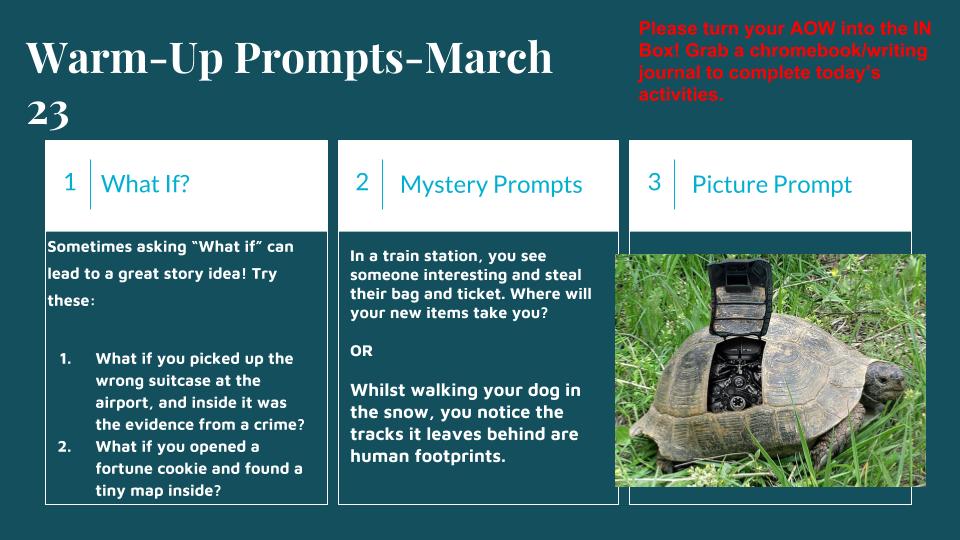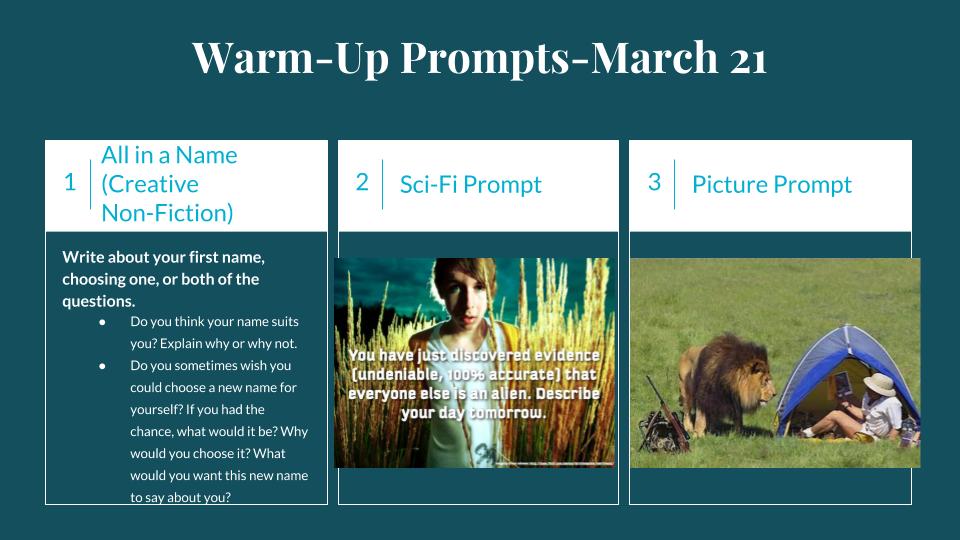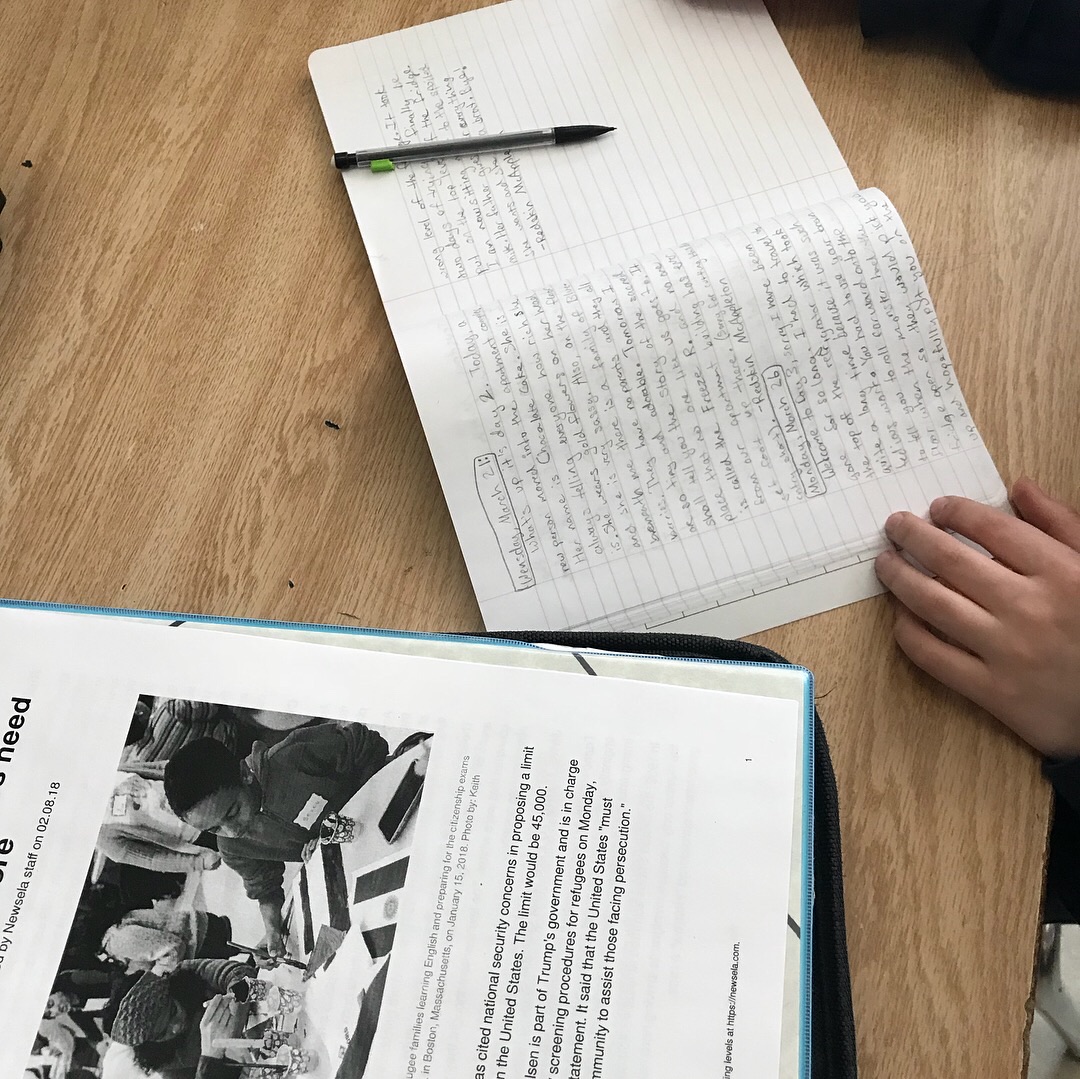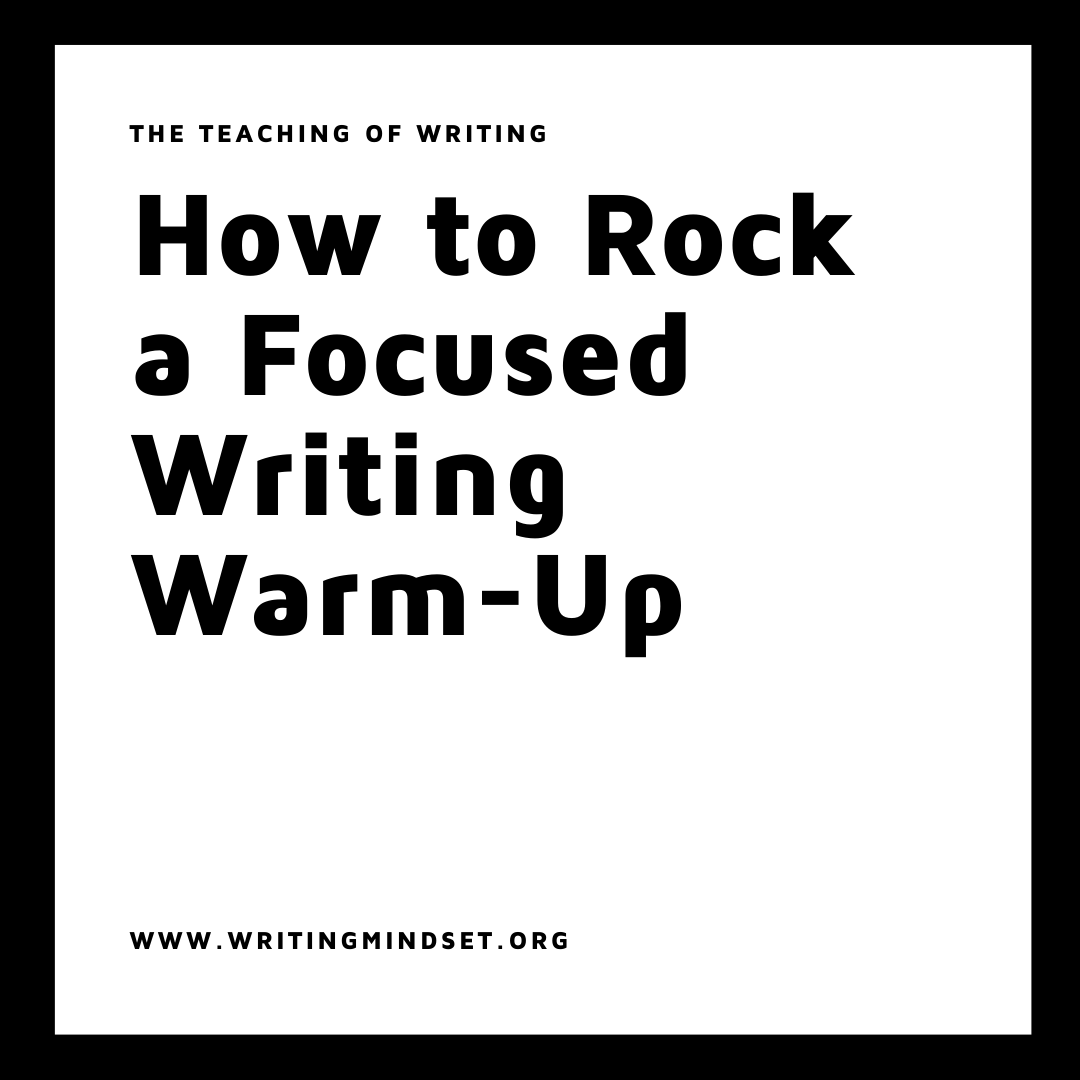How to Rock a Focused Writing Warm-Up
Why You Should Give Them Time to Write Every Day
I am not sure what I did before warm-ups. I think what I did before warm-ups when I was first starting out was make a warm-up activity that was catered to each and every lesson. As a new teacher, this was exhausting. After doing some research a couple of summers ago, I moved to canned warm-ups, and I have loved every minute of them. What I mean by canned warm-ups is that each day has a theme and each week uses a specific form. In other terms, there is a plan.
This specific plan started with what I think kids needed. I wanted to focus on the growth mindset, vocabulary, mentor sentences, and creative writing. These were the main areas that kids love and also struggle with in terms of practice and freedom of choice. The breakdown looked like this:
Monday=Mindset Monday
Tuesday=Tough Choice Tuesday (Would You Rathers)
Wednesday=Word Wednesday (Academic Vocabulary and Figurative Language)
Thursday=Revise It Thursday (Mentor Sentences)
Friday=Free Write Friday
Kids love starting the week with Mindset work on Monday, they banter over Tough Choice Tuesdays, and Word Wednesdays have inserted some much-needed test prep vocabulary into my day-to-day instruction. The first trimester went beautifully. The second trimester was going well, but I was starting to notice some discrepancies with the warm-up process. An alert always goes off inside of me when I don't want to do something...and I had started to not want to do warm-ups. If you don't want to start the lesson off with an amazing hook, what is the point of the lesson? The creative writer in me was a little shook. Then, recently, I remembered why I struggled with the canned warm-up in the first place.
I saw students answering the warm-up in an unoriginal way. They didn't sound like themselves. There was no soul. Do you know what I am talking about? For example, if the prompt was: "Remember a time when you were challenged." And next to the prompt there was a picture of a kid falling down on the sidewalk. The response would be something like:
"Blah, Blah, hard work. Blah Blah, never give up. Blah, Blah this is why I learned from my challenges."
They sounded like a herd of robots. It was terrible to grade! I was like my students were getting burnt out on the daily theme of warm-ups. I struggled with this because aren't I supposed to be streamlining my processes? Aren't I supposed to be figuring out ways to make my teaching world easier? They were getting the point of having a full five-sentences on their pages, but they were more concerned about hitting their sentence length requirement than actually making some good writing with good ideas down on the page. I have always dreamed of mixing creative writing with academic writing in so many ways in the classroom. So, the idea of a focused writing warm-up appeared.
How It Works
A focused writing warm-up consists of writing for 10-15 minutes at the start of each class. My students associated this with Friday Free Write; however, why not apply this to other genres and in other areas of writing? I also realized that my students were struggling with writing endurance. They sometimes wanted to write, and they sometimes didn't The need and calling to write-no matter what- was a life skill I was and am dedicated to teaching students. I like to call this the stuff of imagination.
In order for this to be successful, there must be proper preparation and a realization that this is a tool that can be used to make your paper load get smaller, as well as increase the number of time on the clock that students are writing in class.
Writing Genres/Types of Prompts
Life Skills/Character Building Non-Fiction Prompts
Fictional Prompts: Fantasy, Mystery, Realistic Fiction, Thriller, Sci-Fi, Suspense, Horror, Drama, Etc
Poetry
Creative Non-Fiction: Six-Word Memoir, Etc.
Picture Prompts (My Favorite...)
Comics/Graphic Novels
Mentor Texts from Other Authors (I am LOVING The Creativity Project edited by Colby Sharp)
Figurative Language Word Challenges
Lists of Words into Story Prompts
Persuasion/Argumentative Prompts (I love ProCon.Org for this or anything that can spark a debate)
Newspaper Headlines
Facts/Guiness World Recordbook Stats (Kids love these...)
Best Opening Lines
Best Closing Lines
Grab-A-Book Prompts (Grab a book and read a line for inspiration)
GIFS or moving images (I did this with the rollercoaster prompt below...it was really fun)
What Kids Need
Students need composition notebooks in class. I was using warm-up sheets that I collected at the end of every week. While this works, the movement to grade more items in class is something all teachers-not just English teachers-need to embrace. There is no need to take half of the papers home if I am present in the real-time classroom environment. What I mean by this is that there are particular points in the year, in every month, in some of the days (I love Mondays, I hear people hate them...) that they can zone out. Good teachers even do this. We can get so caught up in the flow of every day that perhaps we should ask ourselves: "Are we really paying attention? How can we use each present moment during class to make it so we have retained our sanity and our self-time later on in the day?" The need for teachers to use more of the minutes in class, and less of the minutes outside of class or at home is a real epidemic.
I digress.
Students using notebooks is an important element so they can keep their writing in one place. They need a tool to write with, and they need the time and space to do it. I also supply the music. I love ChillHop Music on Youtube. It has become my obsession in the classroom because finding upbeat instrumentals that don't contain lyrics is key. I like to play this when I need something that helps students to keep going but is not going to lull them to sleep like the sounds of the ocean.
Besides the actual physical elements, I need to prepare the prompts each day. Initially, the warm-up was only involving one question or statement. I now give three choices. I let students decide if they want to continue a story that they have been working on or try something new. If they want none of the above, they can tune into non-fiction prompts, such as, "How is your week going? What would you change about today?" These types of prompts help students tune into personal reflection and also give students much needed time for them. Here are some focused writing prompts I have used so far this last Trimester:
Time for Self
While the idea of journaling seems trivial, it is an important aspect to give students some time for themselves and to let students reset their mindsets. I am not necessarily referencing a growth mindset in particular here, I am talking about areas of our day when associated with calm. I had a trauma training once that recommended that we pause and focus on meditation and mindfulness at least 3 times a day with students. I remember thinking that this was impossible, and students will most definitely laugh at me trying to get them to zen out in the middle of the day. With the rise in student anxiety, the need to help students learn how to cope with stress becomes more and more necessary. Why not use a tool that English teachers today are already using? Writing. Writing is a method to help students cope with anxiety. I tell them to take 10 minutes each day for themselves. This in and of itself is a form of meditation.
But, then again we, as educators, need to ask: "What do students need?" The answer to this question is time to write and reflect where spelling, grammar, punctuation, and ideas are not judged. I have two rules for focused writing time: write and think. The way they get points is looking at the focus and how much you are attempting to get on the page. I find that the majority of students are on-task, and it is my 2-3 that I need to check-in with regarding their writer's block. After all, half of the battle is just getting the courage to start. While some students are using all of their days or times with creative writing, this is still time well spent. Why not give them more time for imagination when my curriculum is full of literary analysis and argumentative essays? They need the time; they deserve it.
In the future, I am going to use warm-ups in phases, Trimester one will use the same canned setup. I really loved how it helped establish the protocol for the school year. When students entered the class, they immediately knew what to do and how to get started in our class routine. However, I want to reexamine Trimester two and three for how to work writing endurance into one of them. Perhaps, this is another area that can be revisited in the future. In the meantime, you will catch writers in 615 writing and thinking until the end of the year.



